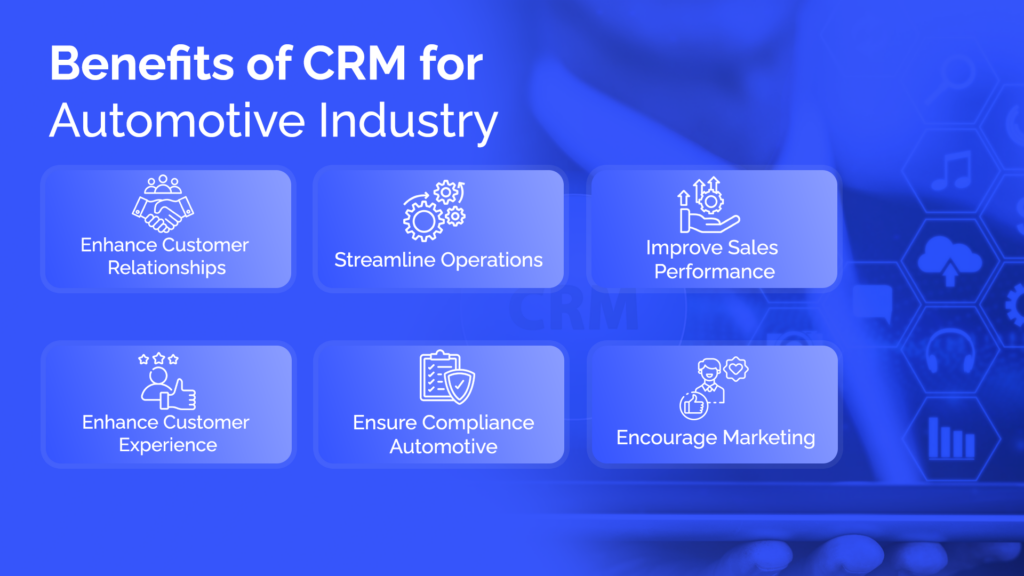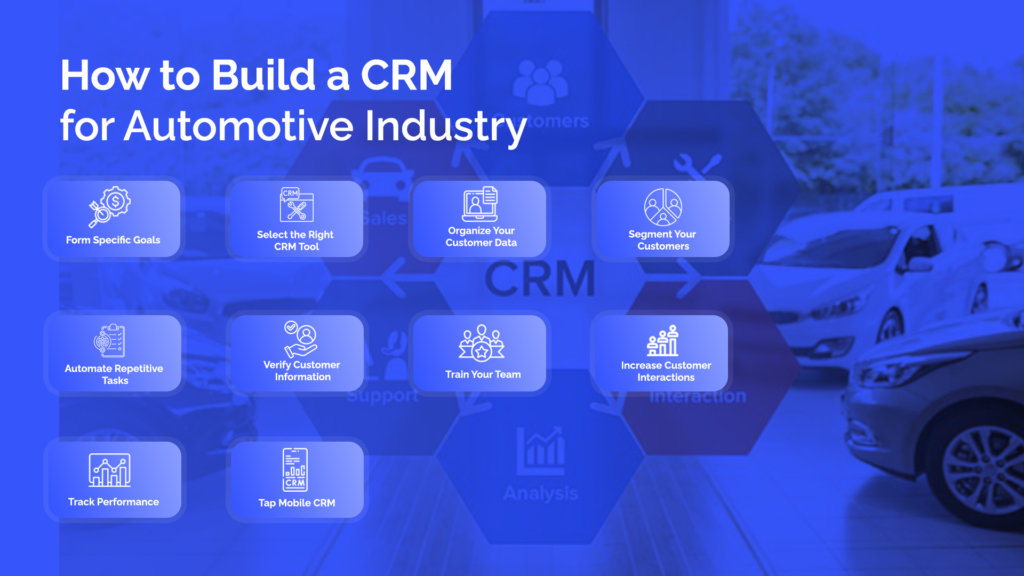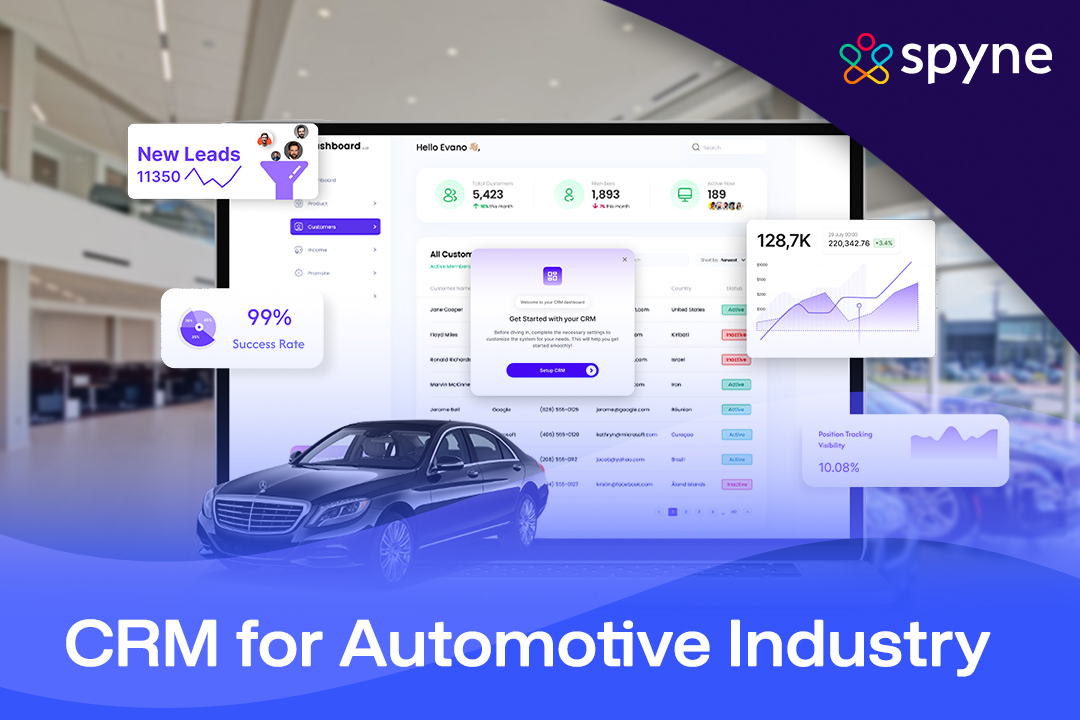Dealerships struggle with outdated processes, not effort. Modern CRM for automotive industry optimise lead management and automate follow-ups, driving sales. Enhancing customer experience and efficiency builds loyalty, gaining a competitive edge. To achieve measurable growth, optimize your operations with a modern CRM solution.
What is CRM for Automotive Industry?
Automotive industry CRM is a special software solution created to assist car dealerships in managing customer relationships, optimizing operations, and enhancing sales. It consolidates customer information, including contact and buying history, to enable used car dealerships to give their customers personalized experiences. Automotive CRM programs automate lead follow-ups and management, among other things, to enable quicker response and increased interaction with potential customers.
They also assist in appointment scheduling and multi-channel sales coordination, allowing used car dealerships to follow up on leads and close deals more efficiently. With the use of CRM tools, car dealerships can increase customer satisfaction, enhance marketing efforts, and improve their overall growth and profitability.
Why You Need CRM for Automotive Industry?
You require CRM for automotive industry because it has the ability to assist dealerships in capturing, qualifying, and following up on leads from various sources. Simplifies the process of buying and selling a car. That’s why it’s necessary.
1. Centralized Customer Management
Automotive CRM tools keep all your customers’ interactions in one spot, so everyone on your team sees the same information. This helps you avoid confusion and gives each customer personalized, helpful service, leading to stronger relationships and faster issue resolution.
2. Enhanced Team Productivity
A CRM assists with communication and automates many workflow processes, saving your employees from dull tasks. This enables your team to focus more on exploring customer relationships and closing deals faster, improving overall productivity.
3. Improved Communication Tracking
The system allows you to track most forms of communication and provides an easy way to tabulate customer interactions. This way, you can ensure your team is communicating correctly and consistently with each customer while keeping the lines of communication open.
4. Insightful Customer Touchpoints
A CRM is designed to customize your employees’ interaction with their customers by interpreting customer behavior and providing helpful information, such as when the customer would want to purchase a product.
5. Enhance Sales Efficiency
Customer relationship management in automotive industry includes an extensive set of reporting and sales forecasting tools that facilitate tracking performance and determining opportunities for improvement. This allows you to optimize profitability based on accurate information.
6. Customize Customer Experiences
The CRM creates a complete customer profile to allow your team to serve your customers on a personal level, which creates reliability and loyalty, which is crucial to maintaining long-term customers.
7. Automated Key Workflows
The system automates routine checklists, such as reminders and personalized outreach, so your team can communicate effectively and on time with leads and customers.
8. Enhance Customer Retention
CRM tracks customer touchpoints and customer needs, allowing dealerships to provide superior customer service. This increases customer satisfaction and, ultimately, customer retention.
By using a CRM for automotive industry, you can effectively manage all stages of the customer journey, from lead collection to sales.
Best CRM for Automotive Industry in 2025
Below is the list of the top 10 CRM for automotive industry for 2025. These automotive CRM companies provide comprehensive dealership management tools, lead tracking, and customer relationship management.
| Automotive CRM Providers | Features |
| Spyne | Spyne utilizes AI for personalized customer interactions, boosting dealership engagement. It offers 24/7 AI reception, automated follow-ups, and sales tracking. Future features include AI-powered lead recovery, all designed to enhance customer satisfaction and streamline sales processes. |
| VinSolutions | VinSolutions protects customer information with its cloud-based CRM. It has seamless integration with dealer systems and automates work. |
| DealerSocket | DealerSocket provides advanced lead management, inventory management, and customer contact solutions, strengthening the sales performance of major dealerships. |
| Impel | Impel provides personalized customer experiences through artificial intelligence. It helps dealerships optimize sales operations and simplify marketing. |
| Podium | Podium is customer communication and reputation-management centred. It assists dealerships in keeping reviews up to date, expanding their online presence, and building customer relationships. |
| AutoRaptor | AutoRaptor offers integrated communication solutions that present the complete picture of customer interaction. It assists dealerships in handling leads efficiently and never missing opportunities. |
| DriveCentric | DriveCentric optimizes the effectiveness of the dealership by using advanced communication platforms. It improves customer relationships and processes. |
| Teamgate | Teamgate CRM simplifies sales pipeline management. It helps dealerships track sales activities and optimize strategies to achieve maximum conversions. |
| Salesforce | Salesforce provides powerful integration features and AI-powered insights. It enables dealerships to customize customer interactions and make informed decisions. |
| CDK Global | CDK Global provides a full-cycle CRM solution with robust analytics and reporting. It helps dealerships make smarter decisions, maximize performance, and grow their businesses. |
Benefits of CRM for Automotive Industry
CRM includes enhancing customer relationships, automating communication, improving sales performance, delivering rational insights, and numerous other tasks.
1. Enhance Customer Relationships
CRM solutions assist your dealership in establishing more personal relationships with your customers. They also consolidate all customer data into a single database so that personalized communication can be conducted across multiple channels, such as email, social media, and calls. This approach makes customers feel special and active during car purchases, reinforcing their value to your dealership.
2. Stay Organised
CRM for automotive industry efficiently automates daily routine tasks such as data entry, follow-up reminders, appointment scheduling, and inventory tracking. This saves time, reduces errors, and improves the sales team’s efficiency, allowing you to focus more on strategic tasks.
3. Improve Sales Performance
CRM follows up on leads from various online marketing sources, categorizes them well, and nurtures the leads in the sales pipeline. It prevents you from losing potential sales and even provides you with customer behavior insights.

4. Enhance Customer Experience
CRM systems analyze customer behavior from the call and preferences to provide personalized experiences. They enable personalized communication, which helps in timely responses to queries, providing a satisfactory customer experience from inquiry to sales service.
5. Encourage Marketing
CRM enables dealerships to focus marketing campaigns more effectively on customer trends and market needs. It enables promotional offers and upselling potential and makes marketing efforts more effective.
6. Ensure Compliance Automotive
CRM automates regulatory work and keeps detailed records to adhere to industry requirements. This reduces the risk of environmental or societal regulations.
Key Features of CRM for Automotive Industry
CRM responsibility in automotive industry involves centralizing data, managing sales/inventory, optimizing operations, enhancing customer experience, and assessing performance.
1. Centralise Customer Data and Communication
A CRM system combines communication by bringing all communication channels, including email, social media, and phone, into one system. It keeps customer data, including purchase history and service records, in one place, giving dealerships an end-to-end view of every customer. This assists in handling interactions and responding instantly to all queries.
2. Manage Leads, Sales, and Inventory
Automotive CRM software employs AI to monitor leads, deal management, and meetings scheduled at the appropriate time to increase sales. They also simplify inventory management by monitoring vehicles available and their location.
3. Optimize Operations and Enhance Customer Experience
By automating tasks like follow-ups, data entry, and scheduling, CRM systems save time and boost efficiency. CRM systems analyze customer behavior to personalize the experience, recommending and making communication seamless along the customer journey.
4. Assess Performance and Improve Strategies
Dealerships use advanced-level analytics to determine their target audience, monitor team performance, and create precise sales projections. Real-time alerts guarantee instantaneous responses every time the company’s customers engage with them.
How to Build a CRM for Automotive Industry
Building a strong automotive CRM systems is important for car dealerships looking to succeed in a competitive automotive market. Through a systematic process of applying the key steps, you can turn customer interactions into growth drivers.
1. Form Specific Goals
Define what you want to achieve with CRM for automotive industry, i.e., how you’d like to increase sales or customer satisfaction. Define specific goals, like improved lead conversion or customer retention, so that you can track your progress.
2. Select the Right CRM Tool
Choose a CRM that best fits the needs of your dealership and your budget. Make sure it has lead management, inventory management, and marketing automation in its functionalities. Make sure that it is easily integrated with your existing systems for seamless functionality.
3. Organize Your Customer Data
Import correct and fresh customer information into the CRM. Clean the files and remove duplicates to keep your information current and pertinent.
4. Segment Your Customers
Segment customers according to their behavior, buying, and preferences. Use these segments to formulate segmentation-based campaigns and personalized offers that appeal to every segment.
5. Automate Repetitive Tasks
Use automation for email marketing, reminders, and follow-ups. It will allow your team to focus on customer interaction and strategy optimization.

6. Verify Customer Information
Study customer data to establish trends and preferences. Use this data to maximize sales strategies, consolidate marketing efforts, and forecast demand.
7. Train Your Team
Offer training sessions so that your employees feel at ease with the utilization of the CRM. Highlight features such as data input, reporting facilities, and mobile CRM usage.
8. Increase Customer Interactions
Utilize automotive CRM software to track interactions through mediums like email, social networks, and phone. Deliver customized messages and offer recommendations based on customer data.
9. Track Performance
Track key measurements such as automobile sales volume, lead conversion rate, and customer satisfaction levels. Read periodically to identify areas of sales operations or areas of improvement in marketing strategy in reports.
10. Tap Mobile CRM
Give your sales representatives mobile CRM-enabled access to get real-time information on inventory and customers. Employees can quickly respond to questions on the floor or outside the office with mobile applications.
How to Choose the Right CRM for Automotive Industry
Choosing the right CRM software for automotive industry can feel challenging, but it’s key for your car dealership’s success. Consider your biggest challenges, like managing leads or keeping track of cars, because the right CRM, potentially even one leveraging AI for car dealerships, will have the automotive crm features you need to boost your business.
1. Define Your Business Requirements
First, identify the problem your dealership is facing. Do you face lead management challenges? Identify the necessary features for your business, like automation or mobility.
2. Seek Core Features
- Successful Lead Management: You need a CRM to capture leads from multiple sources and track them from pipeline to sale.
- Integration with Current Systems: Make sure the CRM seamlessly integrates with current systems like inventory and marketing.
- Access on the Move: Select a device-independent CRM so your team can access customer information anywhere.
- Grow with Your Business: Select a system that grows with you, expanding the number of users and features as your business grows.
- Task Automation: Automate mundane everyday tasks such as follow-up and appointment setting to free up time and boost dealership productivity.
3. Prioritizing Data Security
Select a CRM with robust security features to protect sensitive customer information and comply with industry standards.
4. Assess Support and Training
Select a vendor that has good customer support and training so that your employees can implement the CRM efficiently.
5. Take Advantage of Analytics and Reporting
Seek an auto sale CRM with advanced analytics to monitor sales performance, activity among customers, and the success of marketing campaigns. Utilize them to base decisions on data.
6. Test User-Friendliness
Ensure the CRM is user-friendly with a minimalist and uncomplicated interface that makes work easy for your team.
7. Compare Prices
Shop around and experiment with various plans to find one that fits your pocket without compromising basic features.
By doing so, you can make an intelligent, visionary decision about a CRM that will automate business functions, enrich customer relationships, and fuel the growth of your auto business.
How Spyne’s CRM is the Best Option for Your Automotive Dealership
Spyne’s Connect AI platform offers something unique and new to the automotive industry. Not only is our automotive CRM reasonably priced, but it’s also a solution that will scale with your dealership. We’ve built our tech to work alongside you and grow as you do. Spyne automotive CRM features allow dealers to connect more with their customers.
1. Effective Lead Management
Spyne’s AI-powered automotive lead management tools analyze high activity on places like online marketplaces, vehicle listings, dealership websites, and social media platforms. Through lead capture forms and examining click-through rates, our system gathers these leads and displays them under your automotive CRM dashboard.
2. Lead Recovery for Re-engagement
Spyne’s automotive CRM employs outbound marketing to reconnect with lost leads. Our system guarantees that you remain in contact with customers, whether re-engaged or loyal. With data filtering as per prevailing market tastes, we send out programmed promotional campaigns reaching a wider segment of customers.
3. 24/7 Customer Interaction
Our automotive AI call tracking agent keeps your dealership’s business going even after working hours. Spyne ensures that no opportunity is missed and that your leads are always engaged. Spyne’s AI receptionist agent is always available to pick up a call, be it about vehicle specs, appointment scheduling, or a showroom query. Additionally, all calls placed to your dealership are recorded as summaries for future reference.
4. Automated AI follow-up
Spyne’s automated personalized follow-ups through SMS, email, promotion messages, and call sequences are automated by dealership CRM providers for quick response, which helps in increasing engagement. Send reminders in bulk and reach more clients with targeted marketing. Automating such repetitive operations allows your staff to concentrate on building business relationships with customers.
5. Integrated Customer Data
Having the right customer information under an easy-to-use dashboard streamlines the sales process. This platform lets you access information like contact information, lead ranking, and vehicle preference. With this information, you will be able to target high-value buyers and open up new sales channels. It also helps track lead interactions with the sales team, automatically improving decision-making power.
6. Tracks the Sales Process
The sales pipeline is closely tracked through Spyne automotive sales management. We don’t allow any details to fall between the cracks, so we closely monitor the number of your leads. Spyne also segments the leads based on how likely they are to convert, which implies their activity is divided based on high value. It also helps schedule meetings for sales reps and generate monthly performance reports.
Conclusion
If you are running a used car dealership and want to sell your cars faster, get Spyne’s AI-powered automotive service CRM to manage your dealership’s leads more efficiently. It helps you track, engage, & convert your leads faster to make your sales process smoother. By using a CRM for automotive industry, you’ll be able to connect with customers quickly, follow up without fail, and ultimately close more deals. It’s all about working smarter, not harder, to grow your business.




























